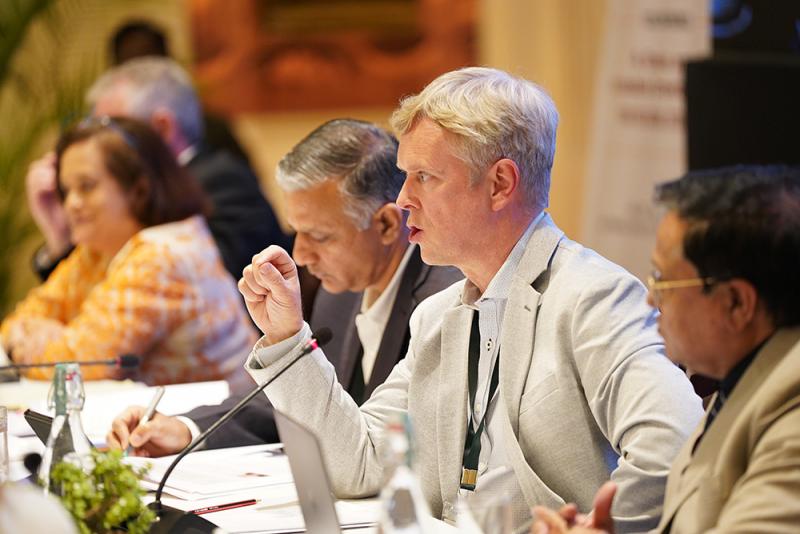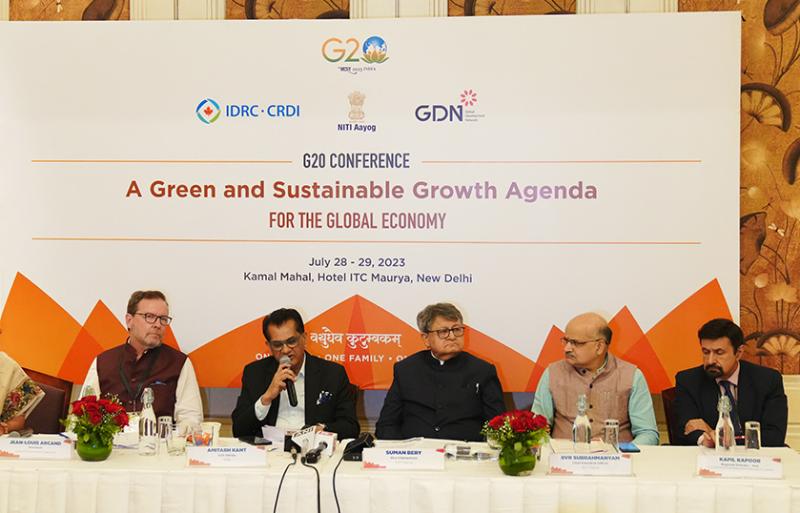
In collaboration with NITI Aayog and International Development Research Centre (IDRC), GDN organized a Conference on A Green and Sustainable Growth Agenda for the Global Economy on July 28-29, 2023 in New Delhi, India. The event brought together 40 leading experts from around the world, as well as, an audience of over 150 from across sectors in India and beyond.



This conference tapped into global expertise to feed into the green and sustainable growth agenda in the context of the current economic, fiscal, environmental, energy and security crises. It
aimed to address growth in relation to topics such as trade, climate change adaptation, resilience, technology and jobs, and financial investments, and brings together leading experts to weigh in on the above issues. The conference fell under the aegis of the Indian G20 Presidency and consisted of the following technical sessions:
- Energy, Climate, Growth
- Technology, Policy, Jobs
- Growth Implications of a Fractured Trading System
- Reshaping Global Finance for Sustainable Growth
- Multilateralism: Geopolitics, Governance and the Global Commons
- Adjustment, Resilience and Inclusion in an Uncertain World
- Roundtable Discussion on ‘How must the G20 Evolve?’
Topics at the very top of the global development agenda were covered, including the energy transition and its financing; links between growth and infrastructure, trade and digitalization; resilience in the face of compounding crises, poverty reduction and inequality; the reform of the multilateral system, including the MDBs; the influence of developing countries in the context of the G20 and its evolving agenda, and more. "Deep conviction is more important than deep pockets," said Nandan Nilekani, Chairman and Founder of Infosys and Founding Chairman, UIDAI.



SOME INTERESTING CONCLUSIONS
- Leveraging the G20 to represent the Global South and advocating a manageable and tangible goals within the SDG framework could yield better outcomes.
- Sustainability should be viewed broadly to encompass human wellbeing rather than strictly economic activity.
- Technologies like AI and Digital Public Infrastructure will be critical source of public service delivery and economic transformation in developing countries.
- There is a need for Global South to strengthen their voice on MDBs reforms, governance, financing, and performance. In this regard, fostering competition among MDBs could propel action on Global commons.
- Strategies for sustained growth should include enhancing productivity in traditional sectors, creating manufacturing jobs, managing competitive exchange rates, closing infrastructure and logistics gaps, and improving education and skills development.
- Financial safety nets need strengthening, bilateral swap lines expanded, and IMF contingency lines invoked to make capital flows safer. The role of credit rating agencies should also be regulated to ensure fair assessments for emerging countries.
- Public sources of funds are not enough and there is a need to leverage private capital in a big way.
- With China facing an aging population, India could step up as the next global growth engine. However, it must address its de-industrialization and boost its manufacturing sector.
- It is important for G20 to coordinate with respect to supply chain and markets for deploying clean tech and energy to eliminate information asymmetries.
- Climate change's challenges require multilateral solutions, including creating resilience funds, de-risking platforms, promoting circular economies, joint technological development, and enhancing green energy security and transition partnerships.
- There is a need to overhaul multilateral institutions and encourage the growth of mini-laterals such as regional organizations such as BRICS and ASEAN.
- Adopting progressive labor practices and leveraging emerging technologies, particularly in developing markets, can be transformative.
- Global commons such as climate action should not be addressed at the cost of aspirations of developing countries.
- Growing middle-income countries need to design social protection schemes that minimize trade-offs associated with coverage expansion and productivity.
- Although improvements are observed in India's multidimensional poverty index, an annual increase in poverty numbers necessitates the development of an inclusion norm based on health, nutrition, and overall wellbeing.
- Scaling up green financing, especially for regions like Africa, will require innovative policies and tools to drive the global transition to net-zero emissions. This includes fostering green investors, enabling policies, and encouraging international cooperation.



A publication will be available before the end of the year and will be part of the hand-over package to Brazil, who assumes the G20 Presidency next.
CONFERENCE AGENDA | SPEAKERS | WATCH THE RECORDING
ABOUT G20
The Group of Twenty (G20) comprises 19 countries (Argentina, Australia, Brazil, Canada, China, France, Germany, India, Indonesia, Italy, Japan, Republic of Korea, Mexico, Russia, Saudi Arabia, South Africa, Türkiye, United Kingdom, and United States) and European Union. The G20 members represent around 85% of the global GDP, over 75% of the global trade, and about two- thirds of the world population. G20 is the premier forum for international economic cooperation and it plays an important role in shaping and strengthening global architecture and governance on all major international economic issues. The G20 Summit is held annually, under the leadership of a rotating Presidency. The G20 Presidency is responsible for bringing together the G20 agenda in consultation with other members and in response to developments in the global economy. India holds the Presidency of the G20 from December 1, 2022 to November 30, 2023.
ABOUT IDRC
As part of Canada’s foreign affairs and development efforts, the International Development Research Centre (IDRC) invests in high-quality research in developing countries, shares knowledge with researchers and policymakers for greater uptake and use, and mobilizes global alliances to build a more sustainable and inclusive world. IDRC’s investments aim to achieve the United Nations’ Sustainable Development Goals (SDGs). They focus on five key areas including climate-resilient food systems; global health; education and science; democratic and inclusive governance; and sustainable inclusive economies.
ABOUT NITI AAYOG
The NITI Aayog serves as the apex public policy think tank of the Government of India, and the nodal agency tasked with catalysing economic development, and fostering cooperative federalism through the involvement of State Governments of India in the economic policy-making process using a bottom-up approach. NITI Aayog is developing itself as a state-of-the-art resource centre with the necessary knowledge and skills that will enable it to act with speed, promote research and innovation, provide strategic policy advice for the government, and deal with contingent issues.





